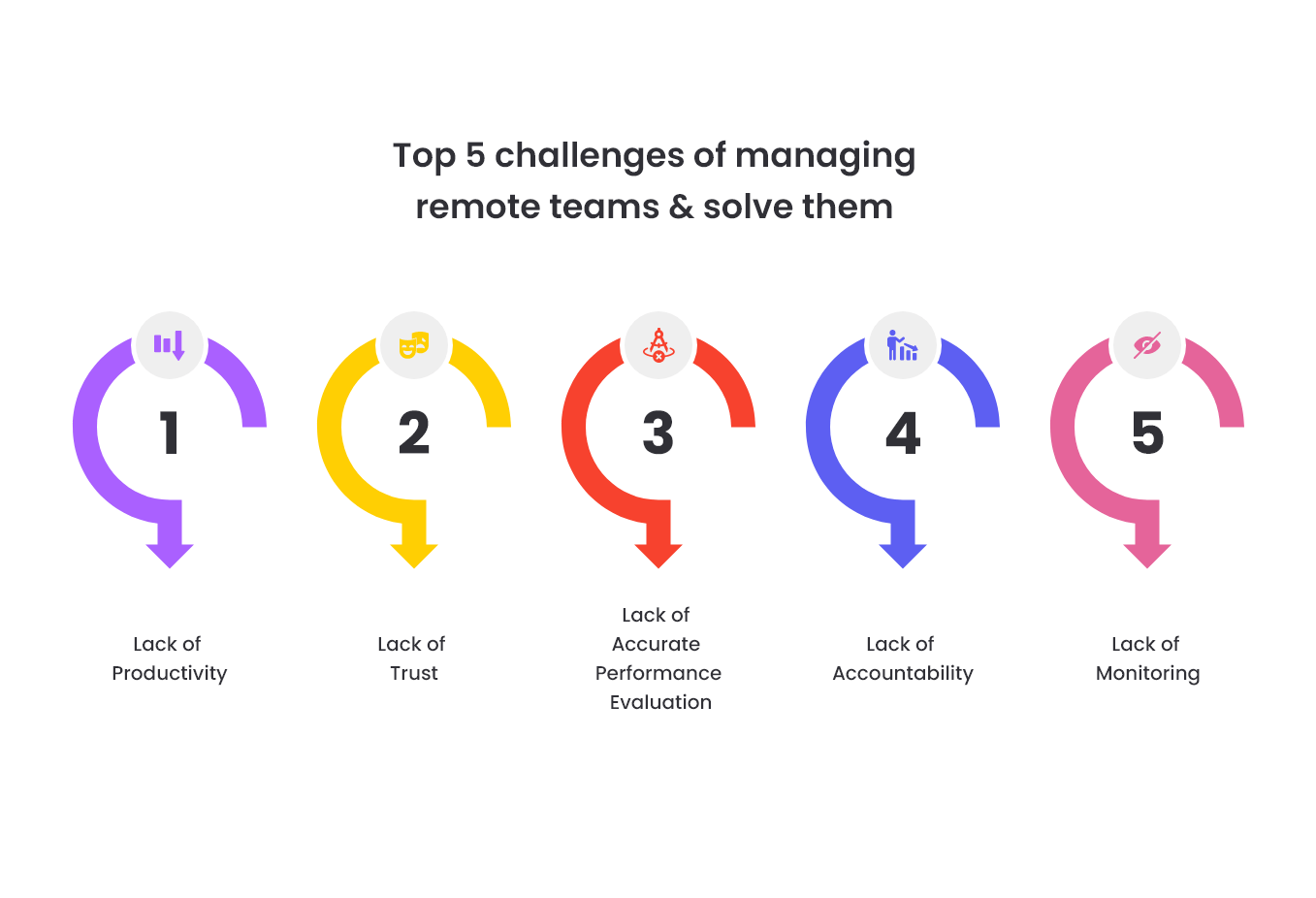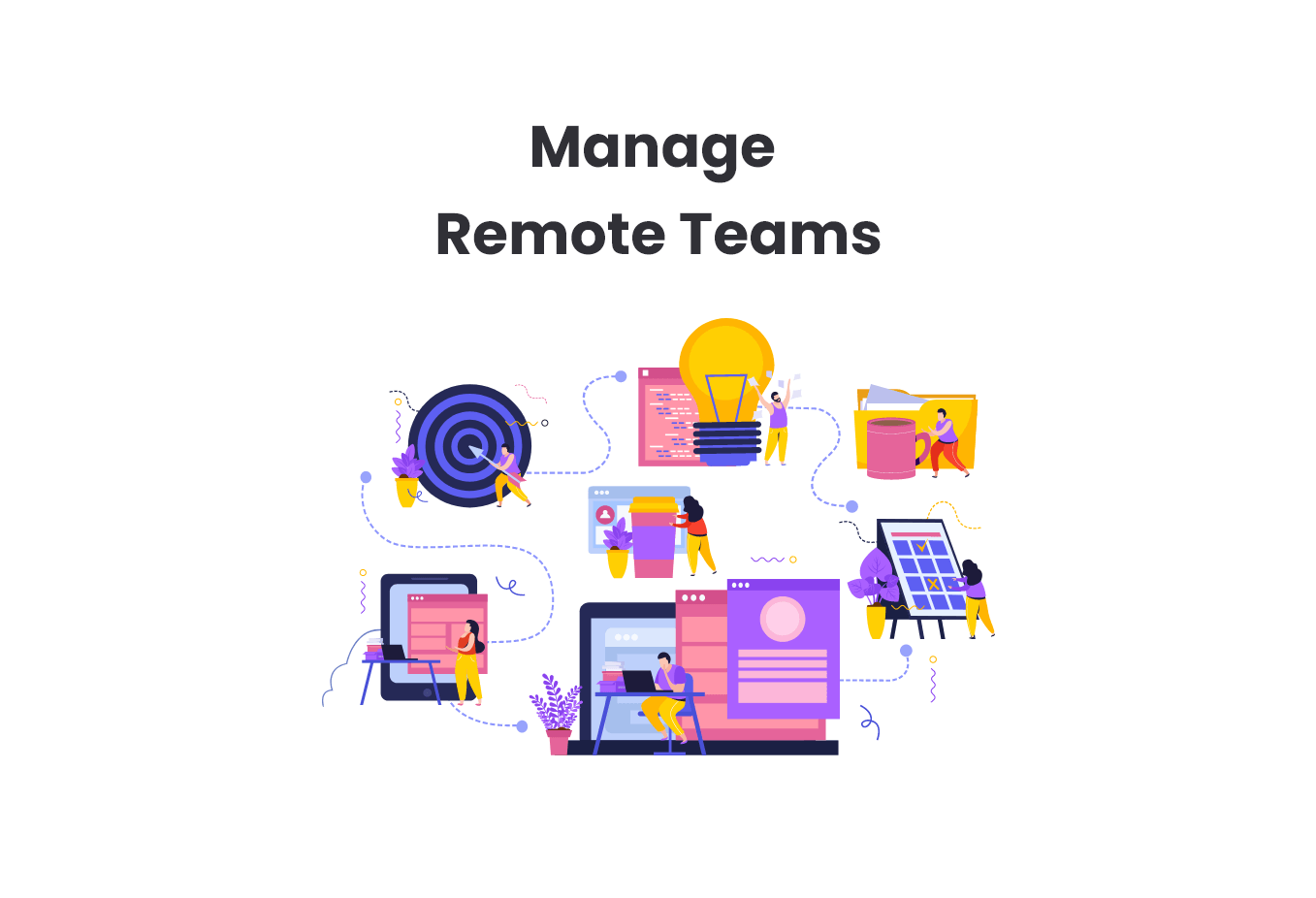How do you manage remote teams? Long-distance relationships are complex because we want the distance not to affect our connection. And this is true for both professional and personal relationships. Nowadays, face-to-face working is becoming less popular as technology advances and information and resources become available to everyone from every corner of the planet.
Companies are adopting remote trends and recruiting top personnel from all around the world. Therefore, more and more managers are now responsible for supervising remote teams. And your duty as the manager of remote team members is to mentor, nurture, and assist team members, which is a difficult task in and of itself. So, this is a guide for managers to help them handle their distant lives and make their staff happier.
What Exactly Is a Remote Team?
A remote team comprises experts from multiple time zones, distinct skill sets, and diverse cultures collaborating on a single project. But each team member works remotely, lives in different places, and works across space and time. Remote work is one thing, but managing a remote team is a completely different story. Also, there is a significant difference between people working in the office and teams operating outside the office.
When you handle remote personnel, you are familiar with team management, project management, and project timeliness. There is undeniably a lot to be said for the remote working culture. Here are some findings from research on remote work:
-
- As per Statista, 35% of participants of a 2020 survey work remotely occasionally, while 16% work remotely full-time
-
- 82% report fewer levels of stress
-
- As per the Harvard Business Review, new video conferencing techniques have made 87% of people feel more connected
Common Difficulties in Managing Remote Teams
To manage remote teams better, managers must know the reasons that can make remote work difficult. Otherwise, high-performing individuals may see a drop in job motivation and achievement when they start working remotely, especially if no preparation or training is available.
But most well-intentioned companies comprise people who are already passively or actively disconnected. So, consider how working remotely affects their level of involvement, performance, and commitment to the purpose.
The following are some of the difficulties associated with remote work:
-
- Inadequate communication tools
-
- Differences in culture and language barriers
-
- There is no accountability program.
-
- Hiring the right resources can be a challenge
-
- Creating timetables for staff members of different time zones
-
- Tracking employee performance is difficult
-
- There is a lack of team cohesion.
-
- There are no clearly defined positions and responsibilities
-
- Making everyone feel like they are a part of the team
-
- Other challenges related to various time zones

Steps to Managing Remote Teams Effectively
Companies such as NationBuilder and others are effectively operating as 100 percent remote businesses. Nonetheless, many businesses are persevering through adversity to operate successfully as remote-working businesses. If you’re continuously asking “How to Manage Remote Teams” and looking for suggestions on how teams have effectively set themselves up remotely, we’ve got some pointers for you.
Best Practices for Managing a Remote Team:
1. Establish Boundaries with Remote Employees
Remote teams frequently require some boundaries to separate their work and personal life. Because the teammates operate in varied time zones, any alerts, chat messages, or emails can disrupt someone’s sleep or family time.
Negotiate working hours with each team member while respecting their time and emphasizing that you value their time. And this will aid in the development of strong relationships with employees, ensuring that nothing is too difficult for anyone.
2. Promote and Value Diversity
It is unsurprising to encounter cultural barriers when managing remote teams. The issue with multicultural teams is that misunderstandings and disagreements divide them. It becomes difficult to manage people of diverse races while still appreciating cultural diversity to enable team formation.
Finding out how various people from different locations are open to accepting criticism, promoting an attitude of enjoying diversity is crucial. Also, being respectful of national holidays for your global staff and respecting every cultural difference are all simple ways to get started.
3. Establish Clear and Early Expectations
Every company has objectives, whether they operate remotely or virtually. Making it transparent to employees will keep them oriented on the same objectives. It would help if you had specific expectations for:
-
- Working hours
-
- Meetings held on time
-
- Important tasks and deadlines
-
- Availability
-
- Systems and methods for effective communication
-
- Meetings that have been scheduled
-
- Reply to email
4. Improve Your Online Communication Skills
When working on projects, many remote working teams experience communication breakdowns. Without effective communication abilities, it is always tough to interact with your teams in diverse places. And, of course, online communication skills are necessary.
Start the conversation quickly and concisely to avoid confusion. Develop your writing abilities, speak clearly, and use the appropriate remote collaboration technologies to communicate effectively. Good communication is essential in the remote workplace.

5. Assist Them When They Need it
Because you are out of sight, you may find it difficult to meet the expectations of every staff member. Even if you’re out of sight, don’t allow them out of your mind.
Unanticipated challenges with projects, teammates, or how the job gets performed are typical in every firm. If something is upsetting your workforce or they’re feeling under the weather, pay attention to the cues they’re giving you and lend them a helping hand.
6. Purchase the Best Remote Project Management Software
When you have everything under one roof, your remote team working culture will flourish. And this is achievable if you use remote team management software to schedule activities, projects, and even individuals. So, here are some examples of what you can do with project management tools:
-
- Make contact with your dispersed team
-
- Real-time information sharing
-
- Have conversations
-
- Keep track of how the project is progressing
-
- Keep track of productivity
-
- Maintain and manage timesheets
-
- Manage the tasks on a task list
-
- Interact with people from different time zones
7. Motivate the Teams Online
Why motivate your remote team online? In general office settings, management does various things to motivate their staff for increased motivation. For example, team members’ birthday parties, yearly Christmas parties, weekend get-togethers, etc. And the good news is that such events can occur in remote settings as well.
Management can motivate remote team members online a few times a month (about twice a month) by organizing gaming events, entertainment events, consultation events, and so on. In its simplest form, the management can achieve this motivation by dividing remote team members into two or three groups and holding Q & A sessions. Such activities can now take place in real-time, thanks to advances in digital technologies. And this aims to help remote team members know each other better to the point where they work in office settings, strengthening their professional relationships.
Why Do We Appreciate Remote Teams?
Treinetic understands how much easier it is to get to know someone who sits next to you all day. You work together and for hours on end, and you’ll get to know them inside and out, their weaknesses and strengths, and what kind of personality they have. But when working remotely, you will need to experiment a little to understand your colleagues. Make it a point to engage in a conversation that helps to learn about their personalities. And this fosters a healthy culture within your remote workforce. It helps us provide a wide range of world-class services to both local and international clients.
As the market expands, so should your workforce. And if you must manage remote teams, make sure you are aware of their heartbeat. With the correct tips and methods for efficiently managing remote employees, you can establish an active business with your remote employees. Remote working may do wonders for your company if you are willing to put in the extra effort and push your team to victory.

